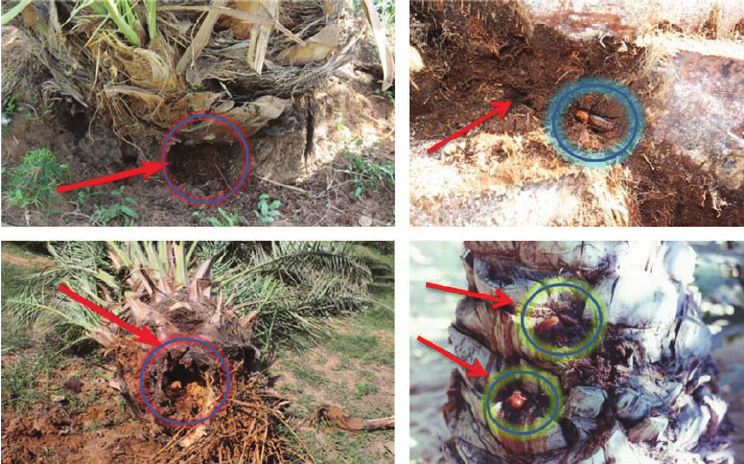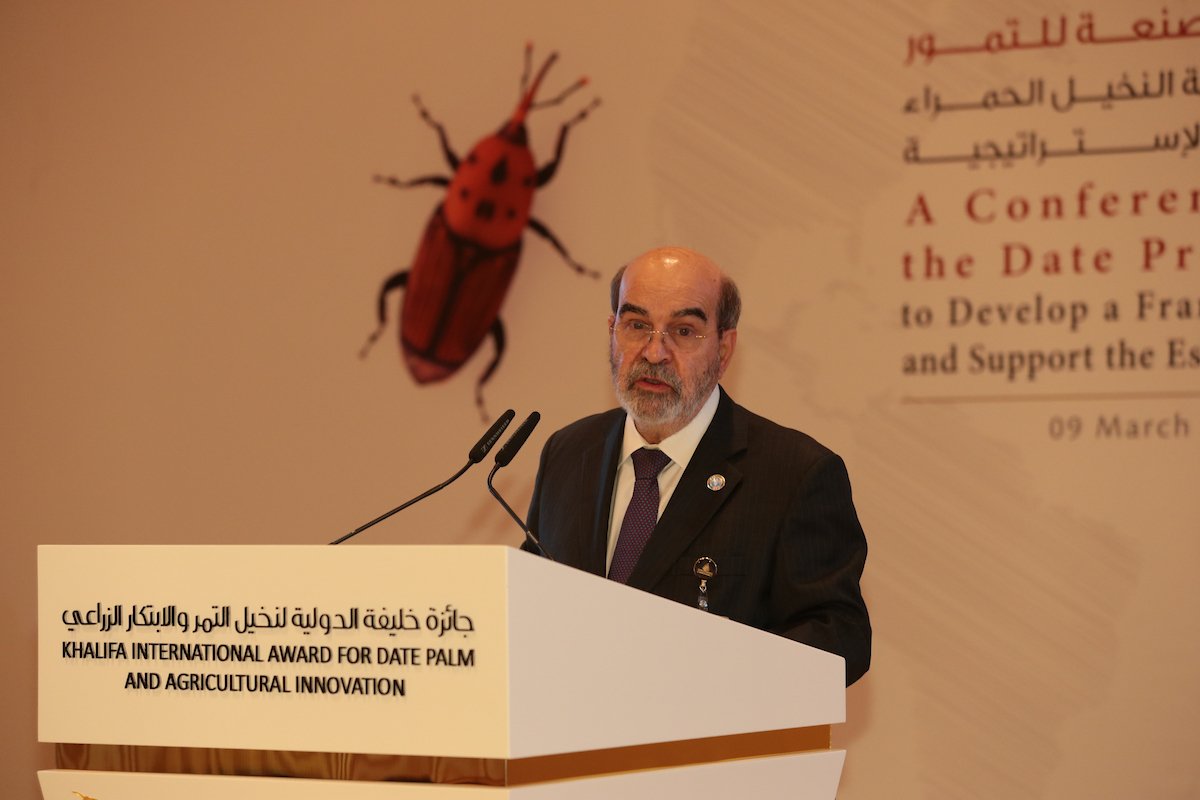9 – 10 March 2019. The United Arab Emirates hosted the Conference of Agricultural Ministers of the World’s Date Producing and Processing Countries.
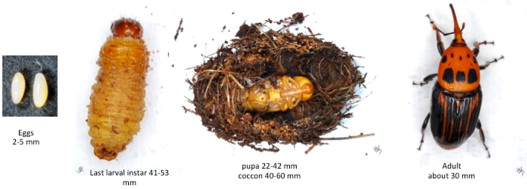 Amid growing international concern about the danger the red palm weevil poses to the health of palm trees and, ultimately, the future of date production, the event will convene ministers of agriculture from date producing and processing countries around the world as well as heads of concerned international organisations.
Amid growing international concern about the danger the red palm weevil poses to the health of palm trees and, ultimately, the future of date production, the event will convene ministers of agriculture from date producing and processing countries around the world as well as heads of concerned international organisations.
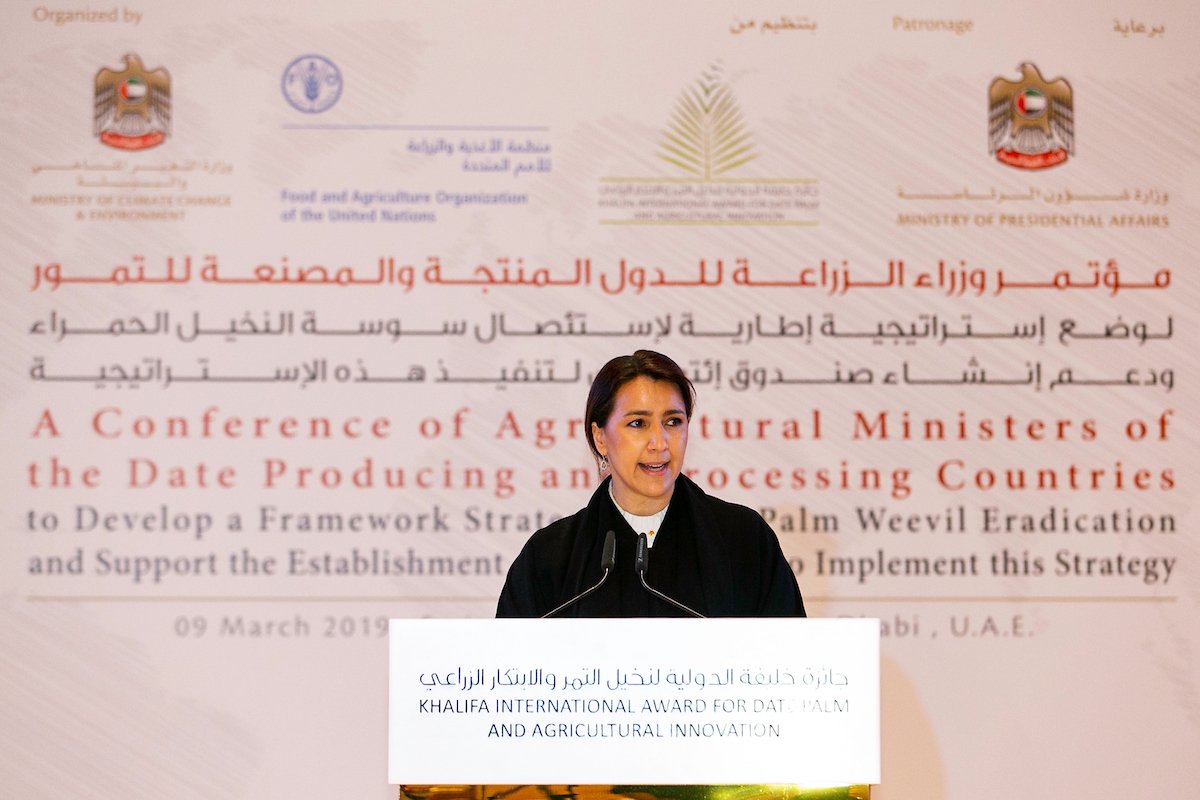 The Red Palm Weevil, an insect originating in South East Asia that has spread rapidly through the Near East and North Africa, is the most dangerous and destructive pest of palm trees worldwide. Feeding on the trees’ growing tissue from the inside, it is particularly difficult to detect during the early stages of infestation. Along with other palm species, the transboundary pest threatens the data palm.
The Red Palm Weevil, an insect originating in South East Asia that has spread rapidly through the Near East and North Africa, is the most dangerous and destructive pest of palm trees worldwide. Feeding on the trees’ growing tissue from the inside, it is particularly difficult to detect during the early stages of infestation. Along with other palm species, the transboundary pest threatens the data palm.
Mariam Al Mehairi (see picture) the Minister of State for Food Security of the United Arab Emirates, announced the $2 million contribution to FAO’s five-year regional programme to combat.
“The programme focuses on three interrelated elements: research, capacity development and, transfer of knowledge and technology. The programme, the noted, is underpinned by an integrated pest-management approach, one that has been particularly successful in Mauritania where the spread of Red Palm Weevil has been curbed, mostly thanks to the active participation of farmers and their cooperatives.” Graziano da Silva
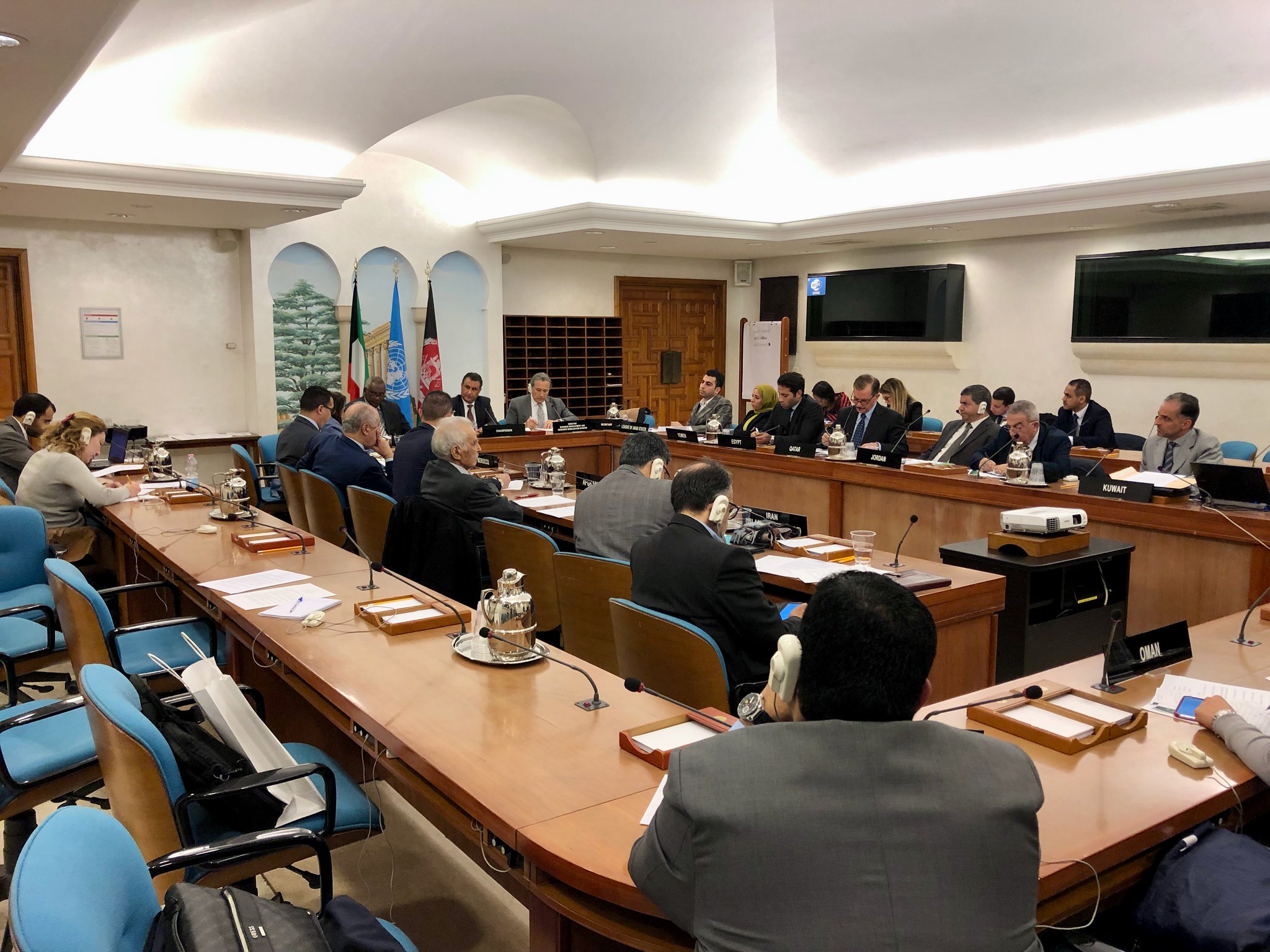 |
| 7 March 2019. The Near East Group of Member States joined a briefing on the preparation of the Abu Dhabi Donors Conference on the #RedPalmWeevil |
Two years ago (29- 31 March 2017) FAO hosted a Scientific Consultation and High-Level Meeting in Rome to unite the efforts to tackle the Red Palm Weevil. FAO has also joined forces with important partners, such as the Khalifa International Award for Date Palm and Agricultural Innovation (KIADPAI); the Arab Organization for Agricultural Development (AOAD); the International Centre for Agricultural Research in the Dry Areas (ICARDA), the International Center for Biosaline Agriculture, and the Mediterranean Agronomic Institute of Bari (CIHEAM) (see the declaration).
FAO is developing simple yet powerful tools to assist farmers in better monitoring and managing the Red Palm Weevil. A mobile app, SusaHamra, is used to collect standard data when inspecting and treating palms and checking pheromone traps for Red Palm Weevil. A global platform is being established for mapping field data and analytics for better decision making. Remote sensing is being combined with artificial intelligence to map palm trees for improved monitoring of Red Palm Weevil spread.
 Related: 23-25 October 2018. CIHEAM Bari. International meeting – Innovative and sustainable approaches to control the Red Palm Weevil (RPW).
Related: 23-25 October 2018. CIHEAM Bari. International meeting – Innovative and sustainable approaches to control the Red Palm Weevil (RPW).
El Bouhssini, Jose Romeno Hilario Faleiro De Socorro. (30/11/2018). Date Palm Pests and Diseases: Integrated Management Guide . Lebanon: International Center for Agricultural Research in the Dry Areas (ICARDA).
This IPM guide on date palm offers a sustainable and scientific approach to managing date palm pests and diseases.
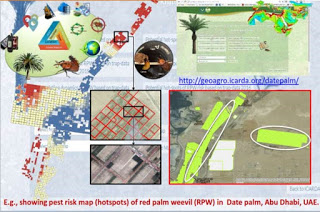 Mapping and Monitoring Insect Pests and Disease Risks in Date Palms
Mapping and Monitoring Insect Pests and Disease Risks in Date Palms
 Related: 11th edition of Khalifa International Award for Date Palm and Agricultural Innovation award ceremony
Related: 11th edition of Khalifa International Award for Date Palm and Agricultural Innovation award ceremony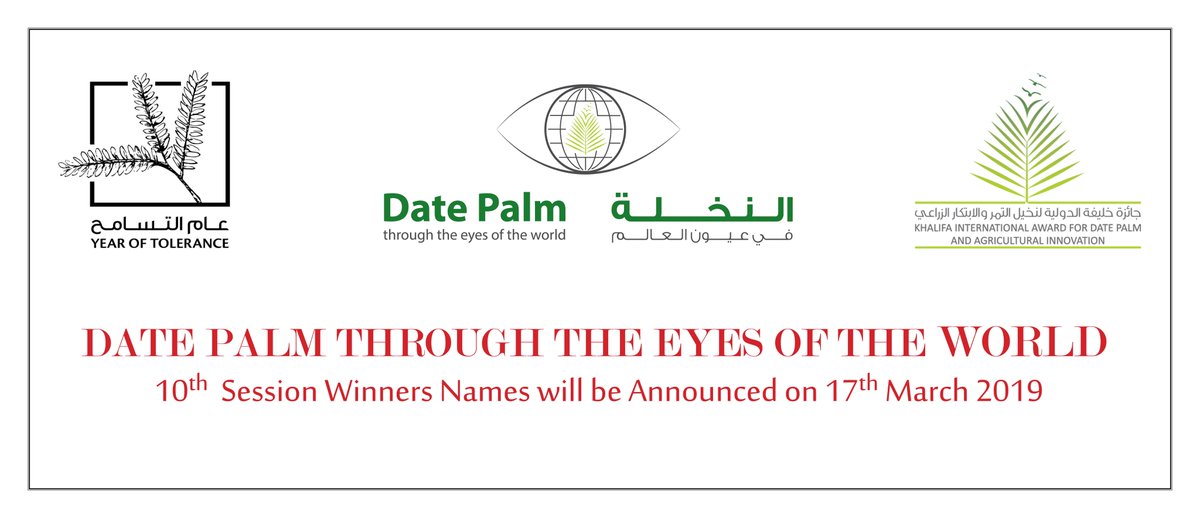
The United Arab Emirates announced the support of USD 2 million towards a trust fund to support the international strategy of eradicating the Red Palm Weevil at the “Conference of Agriculture Ministers of the World’s Date Producing and Processing Countries” in Abu Dhabi. pic.twitter.com/uUpoXYPw8Y— Mariam bint Mohammed Almheiri (@mariammalmheiri) March 9, 2019
Source: PAEPARD FEED
by secretary
by secretary
by secretary
by secretary
by secretary
by secretary
by secretary
by secretary
by secretary
by secretary
by secretary
by secretary
by secretary
by secretary
by secretary
by secretary
by secretary
by secretary
by secretary
by secretary
by secretary
by secretary
by secretary
by secretary
by secretary
by secretary
by secretary
by secretary
by secretary
by secretary
by secretary
by secretary
by secretary
by secretary
by secretary
by secretary
by secretary
by secretary
by secretary
by secretary
by secretary
by secretary
by secretary
by secretary
by secretary
by secretary
by secretary
by secretary
by secretary
by secretary
by secretary
by secretary
by secretary
by secretary
by secretary
by secretary
by secretary
by secretary
by secretary
by secretary
by secretary
by secretary
by secretary
by secretary
by secretary
by secretary
by secretary
by secretary
by secretary
by secretary
by secretary
by secretary
by secretary
by secretary
by secretary
by secretary
by secretary
by secretary
by secretary
by secretary
by secretary
by secretary
by secretary
by secretary
by secretary
by secretary
by secretary
by secretary
by secretary
by secretary
by secretary
by secretary
by secretary
by secretary
by secretary
by secretary
by secretary
by secretary
by secretary
by secretary
by secretary
by secretary
by secretary
by secretary
by secretary
by secretary
by secretary
by secretary
by secretary
by secretary
by secretary
by secretary
by secretary
by secretary
by secretary
by secretary
by secretary
by secretary
by secretary
by secretary
by secretary
by secretary
by secretary
by secretary
by secretary
by secretary
by secretary
by secretary
by secretary
by secretary
by secretary
by secretary
by secretary
by secretary
by secretary
by secretary
by secretary
by secretary
by secretary
by secretary
by secretary
by secretary
by secretary
by secretary
by secretary
by secretary
by secretary
by secretary
by secretary
by secretary
by secretary
by secretary
by secretary
by secretary
by secretary
by secretary
by secretary
by secretary
by secretary
by secretary
by secretary
by secretary
by secretary
by secretary
by secretary
by secretary
by secretary
by secretary
by secretary
by secretary
by secretary
by secretary
by secretary
by secretary
by secretary
by secretary
by secretary
by secretary
by secretary
by secretary
by secretary
by secretary
by secretary
by secretary
by secretary
by secretary
by secretary
by secretary
by secretary
by secretary
by secretary
by secretary
by secretary
by secretary
by secretary
by secretary
by secretary
by secretary
by secretary
by secretary
by secretary
by secretary
by secretary
by secretary
by secretary
by secretary
by secretary
by secretary
by secretary
by secretary
by secretary
by secretary
by secretary
by secretary
by secretary
by secretary
by secretary
by secretary
by secretary
by secretary
by secretary
by secretary
by secretary
by secretary
by secretary
by secretary
by secretary
by secretary
by secretary
by secretary
by secretary
by secretary
by secretary
by secretary
by secretary
by secretary
by secretary
by secretary
by secretary
by secretary
by secretary
by secretary
by secretary
by secretary
by secretary
by secretary
by secretary
by secretary
by secretary
by secretary
by secretary
by secretary
by secretary
by secretary
by secretary
by secretary
by secretary
by secretary
by secretary
by secretary
by secretary
by secretary
by secretary
by secretary
by secretary
by secretary
by secretary
by secretary
by secretary
by secretary
by secretary
by secretary
by secretary
by secretary
by secretary
by secretary
by secretary
by secretary
by secretary
by secretary
by secretary
by secretary
by secretary
by secretary
by secretary
by secretary
by secretary
by secretary
by secretary
by secretary
by secretary
by secretary
by secretary
by secretary
by secretary
by secretary
by secretary
by secretary
by secretary
by secretary
by secretary
by secretary
by secretary
by secretary
by secretary
by secretary
by secretary
by secretary
by secretary
by secretary
by secretary
by secretary
by secretary
by secretary
by secretary
by secretary
by secretary
by secretary
by secretary
by secretary
by secretary
by secretary
by secretary
by secretary
by secretary
by secretary
by secretary
by secretary
by secretary
by secretary
by secretary
by secretary
by secretary
by secretary
by secretary
by secretary
by secretary
by secretary
by secretary
by secretary
by secretary
by secretary
by secretary
by secretary
by secretary
by secretary
by secretary
by secretary
by secretary
by secretary
by secretary
by secretary
by secretary
by secretary
by secretary
by secretary
by secretary
by secretary
by secretary
by secretary
by secretary
by secretary
by secretary
by secretary
by secretary
by secretary
by secretary
by secretary
by secretary
by secretary
by secretary
by secretary
by secretary
by secretary
by secretary
by secretary
by secretary
by secretary
by secretary
by secretary
by secretary
by secretary
by secretary
by secretary
by secretary
by secretary
by secretary
by secretary
by secretary
by secretary
by secretary
by secretary
by secretary
by secretary
by secretary
by secretary
by secretary
by secretary
by secretary
by secretary
by secretary
by secretary
by secretary
by secretary
by secretary
by secretary
by secretary
by secretary
by secretary
by secretary
by secretary
by secretary
by secretary
by secretary
by secretary
by secretary
by secretary
by secretary
by secretary
by secretary
by secretary
by secretary
by secretary
by secretary
by secretary
by secretary
by secretary
by secretary
by secretary
by secretary
by secretary
by secretary
by secretary
by secretary
by secretary
by secretary
by secretary
by secretary
by secretary
by secretary
by secretary
by secretary
by secretary
by secretary
by secretary
by secretary
by secretary
by secretary
by secretary
by secretary
by secretary
by secretary
by secretary
by secretary
by secretary
by secretary
by secretary
by secretary
by secretary
by secretary
by secretary
by secretary
by secretary
by secretary
by secretary
by secretary
by secretary
by secretary
by secretary
by secretary
by secretary
by secretary
by secretary
by secretary
by secretary
by secretary
by secretary
by secretary
by secretary
by secretary
by secretary
by secretary
by secretary
by secretary
by secretary
by secretary
by secretary
by secretary
by secretary
by secretary
by secretary
by secretary
by secretary
by secretary
by secretary
by secretary
by secretary
by secretary
by secretary
by secretary
by secretary
by secretary
by secretary
by secretary
by secretary
by secretary
by secretary
by secretary
by secretary
by secretary
by secretary
by secretary
by secretary
by secretary
by secretary
by secretary
by secretary
by secretary
by secretary
by secretary
by secretary
by secretary
by secretary
by secretary
by secretary
by secretary
by secretary
by secretary
by secretary
by secretary
by secretary
by secretary
by secretary
by secretary
by secretary
by secretary
by secretary
by secretary
by secretary
by secretary
by secretary
by secretary
by secretary
by secretary
by secretary
by secretary
by secretary
by secretary
by secretary
by secretary
by secretary
by secretary
by secretary
by secretary
by secretary
by secretary
by secretary
by secretary
by secretary
by secretary
by secretary
by secretary
by secretary
by secretary
by secretary
by secretary
by secretary
by secretary
by secretary
by secretary
by secretary
by secretary
by secretary
by secretary
by secretary
by secretary
by secretary
by secretary
by secretary
by secretary
by secretary
by secretary
by secretary
by secretary
by secretary
by secretary
by secretary
by secretary
by secretary
by secretary
by secretary
by secretary
by secretary
by secretary
by secretary
by secretary
by secretary
by secretary
by secretary
by secretary
by secretary
by secretary
by secretary
by secretary
by secretary
by secretary
by secretary
by secretary
by secretary
by secretary
by secretary
by secretary
by secretary
by secretary
by secretary
by secretary
by secretary
by secretary
by secretary
by secretary
by secretary
by secretary
by secretary
by secretary
by secretary
by secretary
by secretary
by secretary
by secretary
by secretary
by secretary
by secretary
by secretary
by secretary
by secretary
by secretary
by secretary
by secretary
by secretary
by secretary
by secretary
by secretary
by secretary
by secretary
by secretary
by secretary
by secretary
by secretary
by secretary
by secretary
by secretary
by secretary
by secretary
by secretary
by secretary
by secretary
by secretary
by secretary
by secretary
by secretary
by secretary
by secretary
by secretary
by secretary
by secretary
by secretary
by secretary
by secretary
by secretary
by secretary
by secretary
by secretary
by secretary
by secretary
by secretary
by secretary
by secretary
by secretary
by secretary
by secretary
by admin
by admin
by admin
by admin
by admin
by admin
by admin
by admin
by admin


